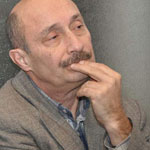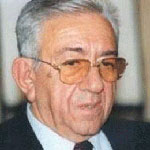Interim status for Nagorno-Karabakh does not mean that it will become an independent entity, Azerbaijani political analyst Zardusht Alizadeh (pictured, below) in conversation with Haqqin.az, commenting on OSCE Minsk Group US Co-Chair James Warlick's speech yesterday on the official policy of the US Government on settlement of the Karabakh conflict.
According to Alizadeh, the US, Russia, and the EU will be closely monitoring the formation of Karabakh: how it complies with international laws, adheres to democratic standards and human rights, ensures the cohabitation of Azerbaijani and Armenian communities, and so on. "Only then will these countries decide whether this formation can survive independently or not," he said.
"Maybe Karabakh will never be endowed with separate status. All these issues have been developed over a long time, and there is nothing new. We, in fact, lose nothing. We return all the occupied territories, and our people [to] Shushi and the other cities of Karabakh, where they lived before the conflict," he added.
Regarding the deployment of peacekeepers in Karabakh, the analyst said neither Russian nor American peacekeepers benefits Azerbaijan. "I think, the main difficult negotiations will be on this issue," he said.
Armenian public figure Ara Nedolyan (pictured, above) believes that the six principles proposed by American diplomacy are still "raw" and don't provide a clear prospect for conflict resolution and the establishment of peace. On his Facebook page, Nedolyan wrote [AM]:"First, Armenia and Azerbaijan agree on the final status of Nagorno-Karabakh. Question: how to agree when their positions are diametrically opposed? Azerbaijan insists that Nagorno-Karabakh must remain within Azerbaijan, which is unacceptable for us.
"The remaining points in the face of this contradiction are meaningless but also have internal contradictions: in particular, if the Lachin and Kelbajar regions do not remain under the control of the Armenian side, the point about ensuring a land corridor between the Republic of Armenia and Nagorno Karabakh becomes meaningless.
"Also meaningless is the point about the return of displaced persons. Because of the reasons I mentioned, Azerbaijanis cannot return to Lachin and Kelbajar, cannot return also to Shushi (it has already been resettled) or Khojaly, which simply doesn't exist. And where should the Armenian residents of Shahumyan and Getashen return, if they are not to be included in the territory of Nagorno-Karabakh?
"Also meaningless is the point about introducing peacekeeping troops because if the parties overcome the aforementioned contradictions and clearly take the path to reconciliation, then peacekeeping forces are simply not needed; they have no problem to resolve. And the introduction of foreign troops on the territory of independent states is itself a destabilizing fact.
"My conclusion: unrealistic principles, which cannot serve as a basis for reconciliation, no matter how much [Armenian President] Serzh [Sargsyan] has not secretly given his approval. It absolutely doesn't oblige us to anything."
According to Azerbaijani political analyst Vafa Guluzade (pictured, above), Baku must agree on the principles articulated by Warlick, since "no one will no longer offer us anything." "All these issues are reflected in the Madrid Principles, and there is nothing new. If they didn't prevent it at the time, [former President of Armenia] Levon Ter-Petrossian had agreed to this option. If the US is principled on this matter, perhaps something will work out with them."
At the same, Guluzade is against deploying Russian and American peacekeepers. "After the events in Ukraine, believing in Russian peacekeepers is the same as not having respect for yourself, and the Americans didn't behave themselves in Kosovo. I think, in this matter we have to defend our own interests," he said.
 Epress.am News from Armenia
Epress.am News from Armenia


